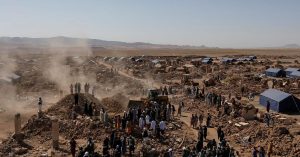Herat, in Afghanistan’s western region, was shaken by another powerful earthquake on Wednesday, prompting authorities to redeploy relief and rescue teams that had been sent out after a string of devastating tremors on Saturday.

Provincial officials reported the destruction of hundreds of homes, but a representative for disaster management told Reuters there were no immediate reports of injuries.
The governor of Herat’s office made a vague statement about “huge losses” in some districts.
A number of injured people have been transported to hospitals by mobile medical teams and officials, according to a statement released by the governor’s office.
At least 2,400 people were killed and nearly 2,000 were injured in the earthquakes on Saturday, the Taliban-run government reported.
The World Health Organisation said that females and young children made up the bulk of the quake’s casualties.
The newest earthquake had a magnitude 6.3 and occurred at a depth of 10 km (6.21 miles), according to the German Research Centre for Geosciences (GFZ).
In the rocky Hindu Kush region bordering Pakistan, earthquakes have a long history in mountainous Afghanistan. Iran, whose border province of Herat is in Afghanistan, has promised to send supplies.
According to Governor Noor Ahmad Shahab, at least 200 homes in the central area of Rubat Sangi were either fully or partially demolished by the earthquakes on Saturday, and the locals had experienced “huge financial losses” as a result.
Since many locals had been forced to sleep outside or in tents due to the preceding earthquakes, he claimed, no fatalities had been reported.
Shahab stated, “People need urgent aid,” adding that survivors were becoming sick from the season’s change to fall.
The decrepit infrastructure caused by decades of war and the lack of foreign aid that was once the backbone of the economy have impeded relief and rescue efforts following Saturday’s earthquakes.
The healthcare system in Afghanistan, which is highly dependent on international help, has also been severely underfunded.
In addition to the 89 million euros in humanitarian aid that has already been committed for 2023, the European Union has announced that it will provide an additional 2.5 million euros ($2.65 million) to humanitarian partners working to deliver relief.
In addition to the usual assortment of emergency equipment, they provided shelter kits, winter tents, and hygiene kits.
Food, blankets, medications, tents, and money have all been promised by Pakistan, Iran, Turkey, and China. Additionally, $5 million in aid has been announced by the UN’s humanitarian office.









































